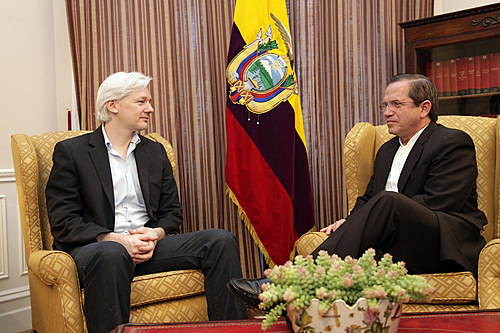
The diplomatic crisis generated by the invasion of the Mexican embassy in Quito by the conservative government of Daniel Noboa, from Ecuador, was the topic of discussion this Tuesday (16) at the Community of Latin American and Caribbean States (Celac). After asking the International Court of Justice for Ecuador’s expulsion from the UN, Mexico asked for support for its position in CELAC.
The president of Venezuela, Nicolás Maduro, expressed support for the proposal and announced the closure of consulates and the Venezuelan embassy in Ecuador. Brazilian President Luiz Inácio Lula da Silva classified the episode as “unacceptable” and stated that Ecuador made a public apology to Mexico.
Considered the most arbitrary international act in the contemporary history of Ecuador by the country’s former chancellor, Guillaume Long, this episode consolidates an authoritarian turn in the country’s diplomacy, which began with the breaking of the political asylum of journalist Julian Assange – who was sheltering in the Ecuadorian embassy in London – in 2019 by the government of Lenín Moreno.
“Both episodes attack the institution of asylum in Latin America and the world. If today Ecuador can do this without facing consequences, tomorrow anyone, including any dictatorship,” said Long in an interview with Brazil in fact.
Both cases represent a violation of international asylum law. In the case of Assange, the former chancellor explains that Ecuador broke the principle of non-refoulement, according to which, after granting asylum, the country cannot withdraw it or expel the asylum seeker, unless the reasons why he requested protection no longer exist.
“In Assange’s case, clearly the reasons behind the asylum still existed, the persecution and the possibility of extradition. But unlike Noboa, the British did not violate the immunity of the Ecuadorian embassy in London because they were invited in by the Ecuadorian government,” Long points out.
For Ecuadorian sociologist Irene León, the current position of Ecuadorian diplomacy represents a paradox since the right to asylum in the inter-American system advanced thanks to Ecuador’s contributions in the Assange case, when the Rafael Correa government granted political asylum to the founder of Wikileaks.
In granting asylum, she points out that the foreign policy of the Citizen Revolution Movement government was anchored “in the sovereignty of knowledge and there have been many developments in this direction.”
“Assange was practically a guest of honor at the Ecuadorian embassy in London, because he contributed enormously to information sovereignty, digital sovereignty and knowledge sovereignty around the world, in addition to having facilitated the dissemination of strategic information for the defense of people.”
Leon considers that the Assange case explains the difference in projects that are in dispute in Ecuador. “The rupture with asylum, with international humanitarian law with the kidnapping of Jorge Glas by Daniel Noboa and the neoliberals in Ecuador, is an attack against the proposal of the Citizen Revolution movement, which is aligned with the left and which, despite the persecution politics and lawfare, is the main political force in the country.”
Assange case
Last week, US President Jor Biden said he was considering Australia’s request to drop the charges against Assange. Arrested in London, the journalist could be sentenced to more than a hundred years in prison for having revealed thousands of US military documents relating to the campaigns in Iraq and Afghanistan.
On the other hand, this Tuesday (16), the US Court responded to the British Court’s request to provide guarantees that Assange would not be sentenced to death if extradited. Analysts believe that with the delivery of these guarantees, the Australian’s extradition would be closer.
Editing: Rodrigo Durão Coelho
Source: www.brasildefato.com.br

